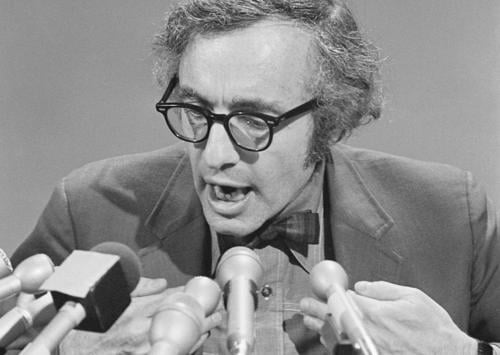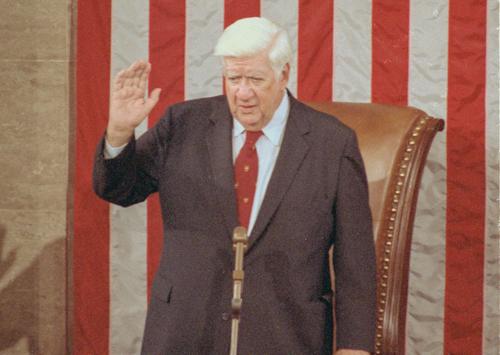Listen to New Voices on Studs Terkel our partnership with 826CHI-here! Read the Story
Showing 1 - 15 of 40 results
-
Wallace Terry reads from and discusses his book "Bloods: An Oral History of the Vietnam War by Black Veterans"
Sep. 26, 1984 Content Warning: This conversation includes racially and/or culturally derogatory language and/or negative depictions of Black and Indigenous people of color, women, and LGBTQI+ individuals. Rather than remove this content, we present it in the context of twentieth-century social history to acknowledge and learn from its impact and to inspire awareness and discussion. Wallace Terry felt it was an important mission to tell people about the Black men who fought in Vietnam. There are stories from 20 men.
-
Thich Nhat Hanh discusses poetry and Vietnam
Apr. 21, 1971 In an interview with Studs Terkel, Buddhist monk, peace activist, and poet Thich Nhat Hanh. The conversation focuses on the devastating effects of the Vietnam War; they discuss the loss of culture and poetry in Vietnam, the anti-war protestors in America and Vietnam, and the sadness and resignation of the Vietnamese. Thich Nhat Hanh talks about America’s role in the war, and his experiences campaigning for peace in the United States and speaking with U.S. anti-war veterans.
-
Terkel comments and presents 1968 Democratic Convention documentary
1968 Terkel comments and presents 1968 Democratic Convention documentary. He is introduced by William F. Malloch, a composer at the Convention.
-
Studs Terkel interviews author-dramatist Frank Norman at his Bloomsbury Square Hotel ; part 1
1968 Terkel delves into the life of Frank Norman, a London ex-con who turned his life around and became a novelist and playwright by writing on his experiences. He wrote "Bang to Rights" shortly after his prison release which brought him great fame. He followed that with "The Monkey Pulled it's Hair" that had a U.S. release under the name "Don't Darling Me Darling". Norman opened up to Terkel discussing his illegitimacy, his illiteracy till age 14, his institutionalization in an orphanage which he turned into the novel "Banana Boy".
-
Seymour M. Hersh reads from and discusses his book "My Lai 4"
May. 22, 1970 Innocent, unarmed villagers were murdered in the horrific massacre in March of 1968. In Seymour M. Hersh's book, "My Lai 4: A Report on the Massacre and Its Aftermath," Seymour further explains that to the soldiers, the killing was simply a game to them, of who could kill the most bodies.
-
Robert Jay Lifton discusses his book "Home from the War"
Jun. 21, 1973 In his book, "Home From the War: Learning from Vietnam Veterans", Robert Jay Lifton reflects on what he's learned from talking with soldiers who came home from the Vietnam War. For some men, guilt and betrayal were common issues -- guilt in what they had done while in Vietnam and betrayal of what their superiors and the government had told them about the war itself.
-
Robert Del Tredici discusses his book "At Work in the Fields of the Bomb"
Jun. 6, 1988 Robert del Tredici photographer, artist, and author discusses the history of nuclear weapon production plants around the United States and the effects of nuclear radiation.
-
Richard Dudman discusses Cambodia and his book “Forty Days with the Enemy”
May. 21, 1971 Reporter and author Richard Dudman discusses and reads from his book “Forty Days with the Enemy”, a book recounting his experience being held captive by the Viet Cong during the Vietnam War. Dudman also discusses Michael Morrow and Elizabeth Pond who were held captive with him.
-
Larry Heinemann discusses his book "Paco's Story"
Nov. 14, 1986 Discussing the novel "Paco's Story" (published by Farrar, Strauss & Giroux) with the author Larry Heinemann.
-
Lady Borton discusses her book "After Sorrow"
May. 10, 1995 In her book, "After Sorrow: An American Among the Vietnamese," Lady Burton tells stories and reflects on what it was like to live among the village people in South Vietnam. Borton found the people to be smart. Among some of her stories, she learned how women carried messages and weapons through enemy territories.
-
Jimmy Breslin, journalist and author discusses his book about the Watergate Affair
May. 22, 1975 Discussing "How the Good Guys Finally Won : Notes from an Impeachment Summer" and interviewing Jimmy Breslin.
-
Interview with Dr. Charles Clements and Asa Baber
May. 20, 1986 Interviewing Vietnam veterans and peace activists Dr. Charles Clements and Asa Baber.




